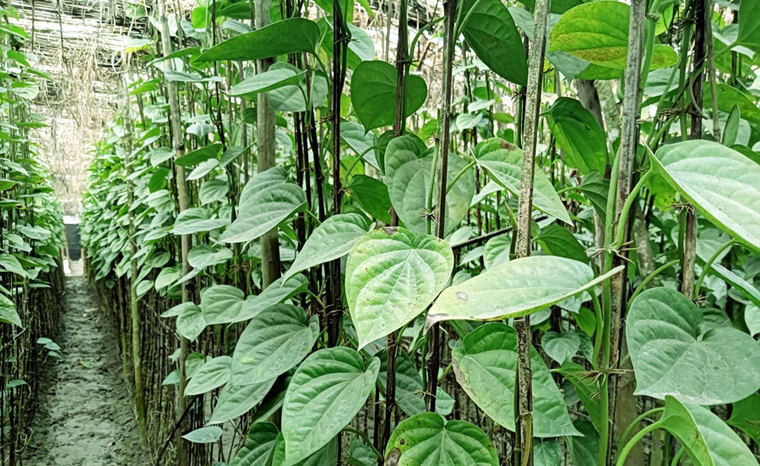
By Md Aynal Haque
RAJSHAHI, March 2, 2023 (BSS) - Farming and production of betel leaf has been playing a vital role towards vitalizing the rural economy as living and livelihood conditions of many villagers are dependent on the cash crop in the region.
For a long time, betel leaf has been acting as the main driving force for farmers, workers and businessmen in terms of their livelihood.
Growers sell their harvested crops to the businessmen at weekly markets directly from their farming field commonly known as 'baraz'.
As a whole, betel leaf is more profitable compared to other crops as the growers avail the scopes of selling the cash crop in local markets easily.
Muktar Hossain, a farmer of village Bakhtiyarpur in Durgapur upazila, said that two types of betel leaves are cultivated in the area, the sweet betel leaf and Sanchi betel leaf.
The sweet betel leaf accounts for 70 per cent of the total cultivation and it was the more popular type among farmers.
Mokbul Hossain, another farmer of Mohanpur upazila, said that his wife and he had been cultivating betel leaf for more than 21 years.
Muhammad Ali, a farmer of Chandapur village in Bagmara upazila of the district, had become self-sufficient through betel leaf farming.
As the first betel leaf grower in his locality, Ali earned fame as a successful farmer in the region.
His three sons - Aminul Islam, Abdul Hamid and Ali Hossain - supported him in his work earnestly.
With the profit of farming betel leaf, Ali built a concrete house for the first time in the area.
His success had inspired many of his neighbours to set up betel gardens and they were all doing well now.
At present, Ali's three sons set up separate baraj or betel gardens and had also become successful farmers.
Aminul Islam said earlier they had very little land and owned only one garden. Now they have 12 bighas of land and have four to five separate gardens.
He said that they worked very hard and spent most of their time nursing the betel leaf plants.
Although they had little formal education, they were now committed to educating their children with their earnings.
Abdul Hamid said that the demand for Bagmara's betel leaf had risen gradually in different parts of the region, including Bogura, Rangpur and Dinajpur.
He said that the leaf was also being exported to different Middle Eastern countries and had become much popular in Saudi Arabia.
Earlier, we used to sell betel leaf at different local markets like Atrai, Taherpur, Mohanganj, Mollapara and Aloknagar, he added.
At present, Aloknagar had become a big market for betel leaf and many wholesalers and retailers came to the market from different areas to purchase the betel leaf.
Professor Aminul Haque of the Department of Agronomy at Rajshahi University said that betel leaf farming was profitable compared to many other crops.
He said that Tk 2 to 3 lakh could easily be earned from one bigha of land if the farming method was modernised.
Betel leaf was grown on around 4,500 hectares of land in the district producing around 75,000 metric tonnes, he said.
The net worth of the crop is around Tk 650 crore annually and over 40,000 farmers are involved in its cultivation directly.
Talking to BSS, Mozder Hossain, Deputy Director of Department of Agriculture Extension (DAE), said the topographic and climatic condition of some upazilas like Mohanpur, Bagmara, Durgapur, Puthia and Paba are very suitable for the farming of the betel leaf.
Around 38,900 farmers have cultivated betel leaves on 4,496 hectares of land with the target of yielding 76,678 metric tons worth around Taka 623.82 crore during the current season.
In the previous season, 37,932 farmers had brought 4,361 hectares of land under the crops farming and they harvested 73,771 tons of yields, he added.
Hossain also said betel leaves are cultivated in all upazilas of the district but Mohanpur is the pioneer in this field.